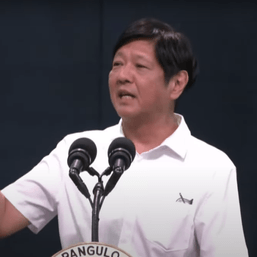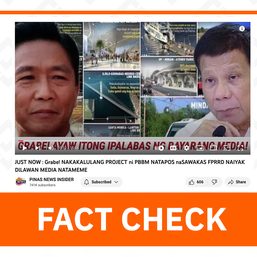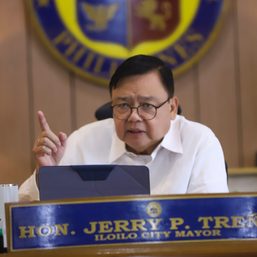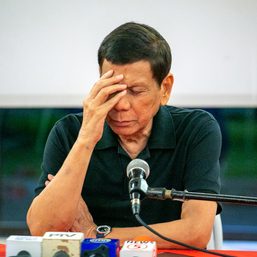SUMMARY
This is AI generated summarization, which may have errors. For context, always refer to the full article.
![[Just Saying] Diminished impact of SC Trillanes decision and Trillanes’ remedy](https://www.rappler.com/tachyon/2024/04/Diminished-impact-of-SC-Trillanes-decision-and-remedy.jpg)
On November 24, 2010, President Benigno Aquino III signed Proclamation No, 75, series of 2010, granting amnesty to a number of rebellious police and military officers and soldiers, including former Senator Antonio Trillanes, for their participation in the July 27, 2003 Oakwood Mutiny, the February 2006 marine-standoff, and the November 29, 2007 Manila Peninsula incident. Pursuant to the 1987 Constitution, the House of Representative and the Senate concurred in the amnesty in December 2010.
Constitutionally, an amnesty proclamation has the force of law and is vested with public interest. An amnesty-grantee “stands in the eyes of the law as if he had never committed any punishable offense.” Also, unlike a presidential pardon which looks forward and merely relieves the offender of the punishment for his crime, “amnesty looks backward and abolishes and puts into oblivion the offense itself, it so overlooks and obliterates the offense with which he is charged that the person released by amnesty stands before the law precisely as though he had committed no offense.” (Barrioquinto et al vs. Fernandez et. al., G.R. No. G.R. No. L-1278 January 21, 1949).
On August 31, 2018, President Duterte issued Proclamation Number (No.) 572, specifically targeting former Senator Antonio Trillanes and the amnesty granted to him declaring that: “The grant of amnesty to former LTSG Antonio Trillanes IV under Proclamation No. 75 is declared void ab initio because he did not comply with the minimum requirements to qualify under the Amnesty proclamation.”
On a technicality therefore, former Senator Trillanes who was already considered innocent by force of law via the amnesty, was again sought to be indicted for the commission of a crime which has already been “put into oblivion.”
The proclamation also ordered the Armed Forces of the Philippines and the Philippine National Police “to employ all lawful means to apprehend former LTSG Antonio Trillanes so that he can be recommitted to the detention facility where he had been incarcerated, for him to stand trial for the crimes he is charged with.”
Regional Trial Court Branch 150 in Makati City issued a warrant of arrest. Senator Trillanes posted bail for his temporary release. In the other Regional Trial Court Branch 148, the case of former Senator Trillanes was dismissed. Eventually, the Court of Appeals quashed the warrant of arrest issued by RTC Branch 150 but maintained the validity of Proclamation No. 572.
On September 6, 2018, former Senator Trillanes went up to the Supreme Court seeking a temporary restraining order (TRO) to stop the implementation of Proclamation No. 572. Swiftly, on September 11, 2018, the Supreme Court denied Trillanes’ plea for a TRO. This was at a time when the animosity between former president Duterte and former senator Trillanes was at its height, as most people also witnessed.
After five years and at this time when former president Duterte is no longer the most powerful man in the Philippines, the Supreme Court announced that Duterte’s Proclamation No. 572 is unconstitutional. According to the Supreme Court press release: “The Court ruled that the revocation of Trillanes’ amnesty long after it became final and without prior notice violated his constitutional right to due process” and his right to equal-protection of the law. The highest tribunal, ruling by the proofs presented, said that there was convincing evidence that senator Trillanes met the necessary requirements for amnesty. Also, since amnesty needed the concurrence of Congress, its revocation should have obtained the concurrence of Congress.
In short, the Supreme Court, in effect, ruled that former Senator Trillanes was correct after all. He was a victim of unconstitutional maneuverings by the previous administration.
The Supreme Court decision is laudable. There is just one glaring oddity that seems to pique the curiosity of many. Why did the Supreme Court not decide this case during then-president Duterte’s reign of power? Had it been decided at that time, it would have been more significant, asseverating that a sitting president with all his authority was not above the law, much more the Constitution.
The judicial rebuke of presidential abuse would have been more astounding. From a public-opinion standpoint, the decision, had it been released during the Duterte presidency, would have emphatically educated the Duterte devotees that their idol had no unlimited power, that the existence of legitimate opposition was necessary in a democracy, and that persecution was anathema to a decent government administration.
And now that Duterte is out, many people may perceive – rightly or wrongly – that suddenly the Supreme Court has found its voice, handing a “courageous” decision – but unfortunately, one that missed the opportunity to produce the impact and significance that such a constitutional issue deserves. It is too late also to strongly and assertively exhibit the democratic check-and-balance process when it was most needed. The “bite” of this decision has diminished.
People might also wonder about the possible reasons for holding the decision in abeyance. Could it be the “fear factor” of a powerful president that has affected a co-equal great department of government? Some might even venture to speculate that the non-decision during Duterte’s time was due to utang na loob for their appointments. If all these were true, then it does not speak well of the Supreme Court which must be without fear nor favor. Only by being unaffected can the stature of its independence be affirmed.
The next question now is this: can those people responsible for the violation, if any, of former Senator Trillanes’ constitutional rights, be held accountable?
Article 32 of the Civil Code unequivocally provides that “any public officer or employee, or ay private individual, who directly or indirectly obstructs, defeats, violates or in any manner impedes or impairs the rights and liberties of another person shall be liable to the latter for damages.” And one of these rights is precisely the right to the equal protection of the laws, the violation of which was one of the reasons why the enforcement of Proclamation No. 572 was rendered unconstitutional.
In the case of Liwayway vs. Fortune Tabacco (G.R. NO. 141309, December 23, 2008), the Supreme Court said that when the violation involves a duty owing to the public in general, the erring public officer will not be liable and the remedy is political. However if the “complaining individual suffers a particular or special injury on account of the public officer’s improper performance or non-performance of his duty,” then he/she can be held liable.
Significantly, the unconstitutional Proclamation No. 572 issued by then-president Rodrigo Duterte was not a general declaration but a directed one targeting only a single person: Trillanes. Following the guideline in the Liwayway case, for former senator Trillanes to hold former president Duterte and other officials liable, he “must show a wrong which he specially or particularly suffered.” I can only surmise that former senator Trillanes and his lawyers are now studying and perhaps making a list of these special and particular injuries which he had suffered, if any.
It is also important to note that good faith is not a defense invocable by a public officer committing any violation of the constitutional rights enumerated in Article 32. It is not necessary that malice or bad faith be made a requisite for holding liable the erring public officer. The Supreme Court, quoting the deliberations of the framers of the Civil Code, in the case of Lim vs Ponce, G.R. No. L-22554, August 29, 1975, said: “To make such a requisite would defeat the main purpose of Article 32 which is the effective protection of individual rights. Public officials in the past have abused their powers on the pretext of justifiable motives or good faith in the performance of their duties. Precisely, the object of the Article is to put an end to official abuse by the pleas of good faith.”
The Supreme Court decision on Trillanes might have arrived late, but it may nevertheless give the former senator a strong legal foundation for what could be the vindication of his violated constitutional rights.
And so, as the political dynamics continue to unfold, we stand and hope with cautious optimism, for a more robust display of independence and separation of powers from the three branches of our government. We also hope that the constitutional and human rights of all citizens, not only the prominent ones, be always safeguarded without delay. – Rappler.com
Mel Sta. Maria is former dean of the Far Eastern University Institute of Law. He teaches law at FEU and the Ateneo School of Law, hosts shows on both radio and Youtube, and has authored several books on law, politics, and current events.
2 comments
How does this make you feel?




![[Closer Look] ‘Join Marcos, avert Duterte’ and the danger of expediency](https://www.rappler.com/tachyon/2024/06/TL-trillanes-duterte-expediency-june-29-2024.jpg?resize=257%2C257&crop_strategy=attention)

![[EDITORIAL] All roads lead to Duterte](https://www.rappler.com/tachyon/2024/06/animated-all-roads-lead-to-duterte-carousel.jpg?resize=257%2C257&crop_strategy=attention)






I see no balls.
I believe the “possible reasons for holding the decision in abeyance” are fear and “utang na loob.” Hence, we have an incident in which the Supreme Court was affected by political pressure from the Executive Department and sadly lost its independence. Indeed: “The (strength of the) ‘bite’ of this decision has diminished,” but it should acutely warn us that it is possible that another President in the future might do the same – this is the ‘bite’ that lingers.